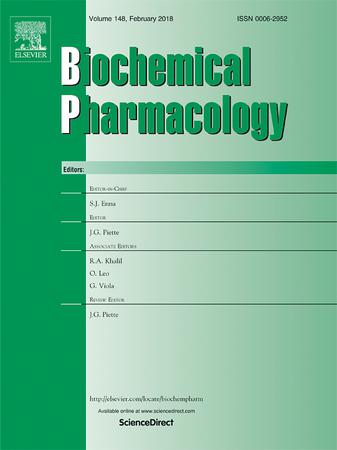Colchicine as a therapeutic possibility for the treatment of pulmonary arterial hypertension (PAH) in a rat model
IF 5.3
2区 医学
Q1 PHARMACOLOGY & PHARMACY
引用次数: 0
Abstract
The right ventricular failure is the most important cause of death in pulmonary arterial hypertension (PAH). Colchicine, a naturally occurring tricyclic alkaloid, protects against inflammatory diseases by favorable modulation of pro-inflammatory cytokine production. In our present work, we aimed to clarify the effects of colchicine treatment in PAH, specifically on right ventricular cardiac myocytes. We examined the effects of colchicine treatment on the pulmonary vasculature and on the right ventricular cardiomyocytes. Pulmonary arterial hypertension was induced in Wistar Kyoto rats by monocrotaline (MCT). Wistar Kyoto (WKY) rats were then treated with colchicine or placebo for two-weeks. Colchicine treatment successfully prevented the development of right ventricular failure in an MCT-induced PAH model. The echocardiographic parameters characterizing right ventricular function improved. The signaling pathways associated with cardiac remodeling showed favorable alterations attributed to colchicine treatment. Consequently, the interstitial collagen deposition was reduced, and the energy supply of right ventricular myocytes was preserved. Colchicine treatment inhibited pulmonary vascular remodeling and reduced the amount of α-smooth muscle actin (α-SMA) and collagen in pulmonary vessel walls. Our results suggest that even a short-term and low-dose colchicine treatment could protect against PAH-induced right ventricular failure. Therefore, colchicine may be a promising therapeutic option in the treatment of PAH.

秋水仙碱在大鼠肺动脉高压(PAH)模型中的治疗可能性
右心室衰竭是肺动脉高压(PAH)患者最重要的死亡原因。秋水仙碱是一种天然存在的三环生物碱,通过有利地调节促炎细胞因子的产生来预防炎症性疾病。在我们目前的工作中,我们旨在阐明秋水仙碱治疗PAH的作用,特别是对右心室心肌细胞的影响。我们检查了秋水仙碱治疗对肺血管和右心室心肌细胞的影响。用MCT诱导Wistar Kyoto大鼠肺动脉高压。Wistar Kyoto (WKY)大鼠用秋水仙碱或安慰剂治疗两周。在mct诱导的PAH模型中,秋水仙碱治疗成功地阻止了右心室衰竭的发展。右心室功能超声心动图指标改善。与心脏重构相关的信号通路在秋水仙碱治疗后显示出有利的改变。因此,减少了间质胶原沉积,保留了右心室肌细胞的能量供应。秋水仙碱抑制肺血管重构,降低肺血管壁α-平滑肌肌动蛋白(α-SMA)和胶原蛋白的含量。我们的研究结果表明,即使短期和低剂量秋水仙碱治疗也可以防止多环芳烃引起的右心室衰竭。因此,秋水仙碱可能是治疗多环芳烃的一个有希望的治疗选择。
本文章由计算机程序翻译,如有差异,请以英文原文为准。
求助全文
约1分钟内获得全文
求助全文
来源期刊

Biochemical pharmacology
医学-药学
CiteScore
10.30
自引率
1.70%
发文量
420
审稿时长
17 days
期刊介绍:
Biochemical Pharmacology publishes original research findings, Commentaries and review articles related to the elucidation of cellular and tissue function(s) at the biochemical and molecular levels, the modification of cellular phenotype(s) by genetic, transcriptional/translational or drug/compound-induced modifications, as well as the pharmacodynamics and pharmacokinetics of xenobiotics and drugs, the latter including both small molecules and biologics.
The journal''s target audience includes scientists engaged in the identification and study of the mechanisms of action of xenobiotics, biologics and drugs and in the drug discovery and development process.
All areas of cellular biology and cellular, tissue/organ and whole animal pharmacology fall within the scope of the journal. Drug classes covered include anti-infectives, anti-inflammatory agents, chemotherapeutics, cardiovascular, endocrinological, immunological, metabolic, neurological and psychiatric drugs, as well as research on drug metabolism and kinetics. While medicinal chemistry is a topic of complimentary interest, manuscripts in this area must contain sufficient biological data to characterize pharmacologically the compounds reported. Submissions describing work focused predominately on chemical synthesis and molecular modeling will not be considered for review.
While particular emphasis is placed on reporting the results of molecular and biochemical studies, research involving the use of tissue and animal models of human pathophysiology and toxicology is of interest to the extent that it helps define drug mechanisms of action, safety and efficacy.
 求助内容:
求助内容: 应助结果提醒方式:
应助结果提醒方式:


